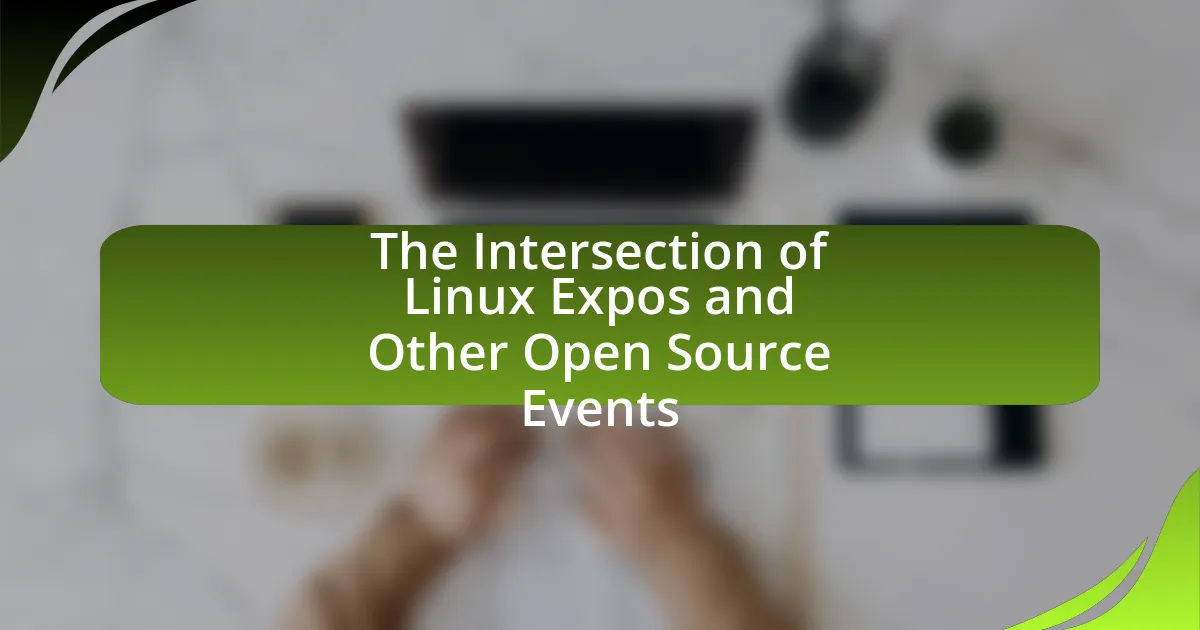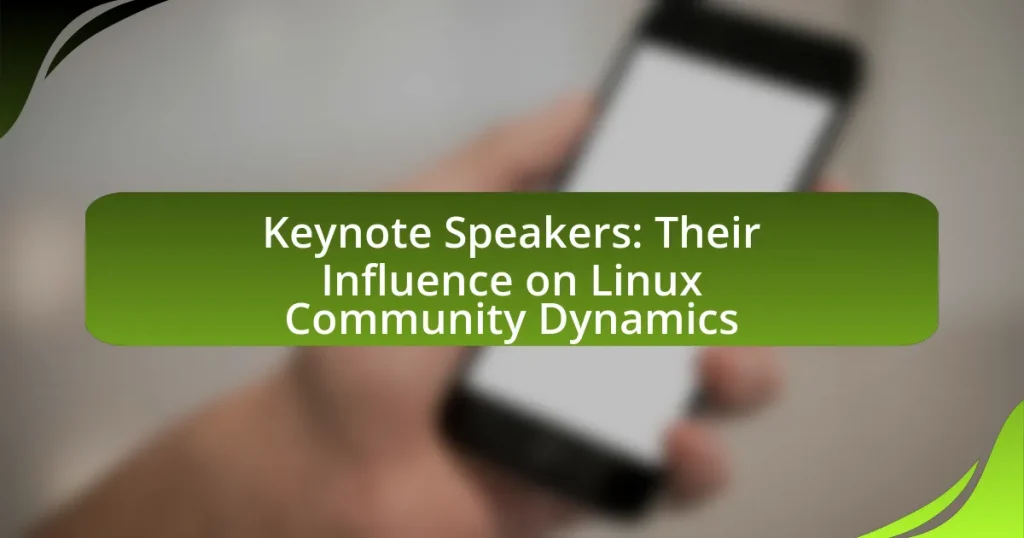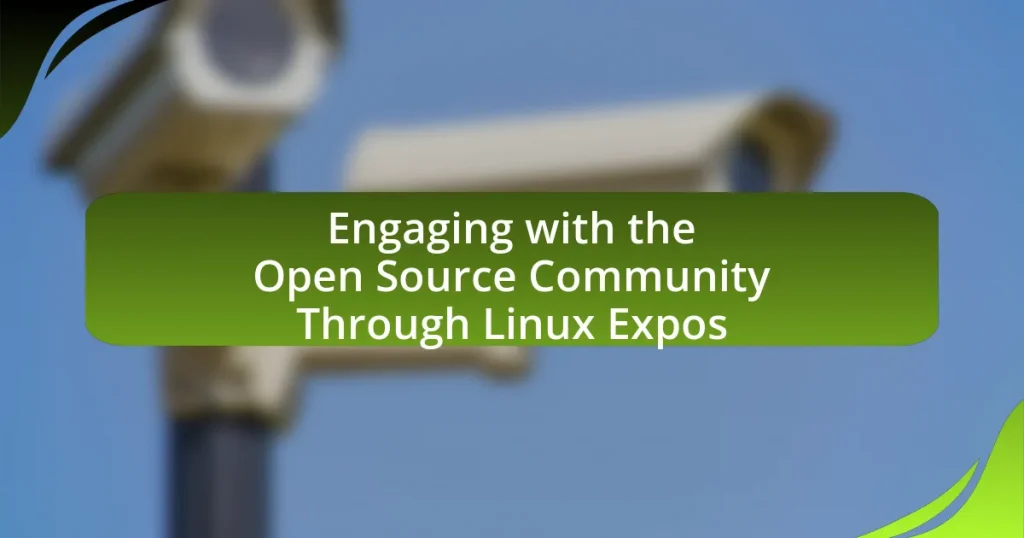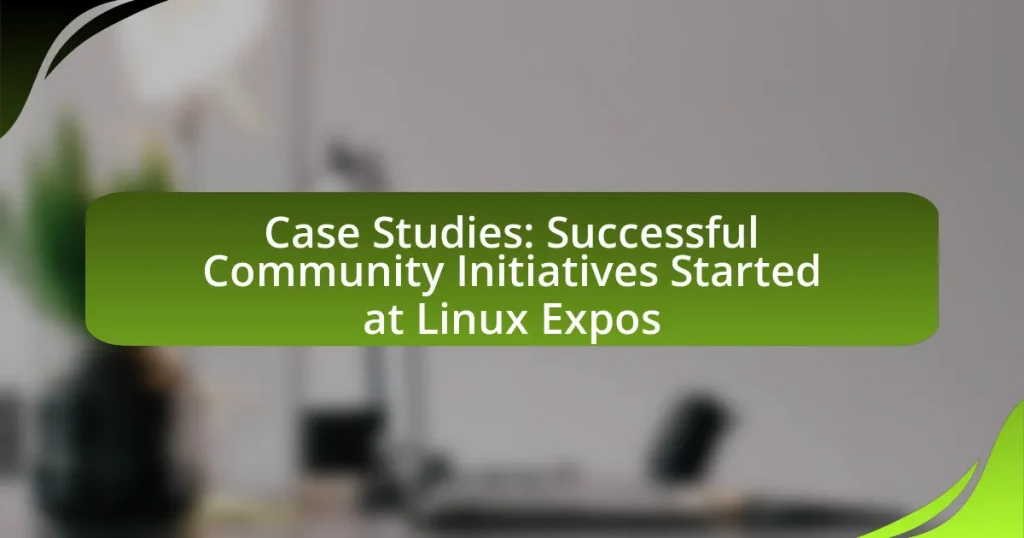Linux Expos and Open Source Events are essential gatherings that promote Linux and open-source software, facilitating knowledge sharing, collaboration, and innovation among developers, enthusiasts, and businesses. The article explores the unique focus of Linux Expos compared to other open source events, highlighting their goals of fostering community engagement and promoting the adoption of open-source technologies. It also discusses the various types of open source events, the importance of networking opportunities, and the challenges faced at the intersection of these events. Additionally, best practices for enhancing participant experiences and the role of feedback in improving future events are examined, emphasizing the significance of collaboration and continuous improvement within the open source ecosystem.
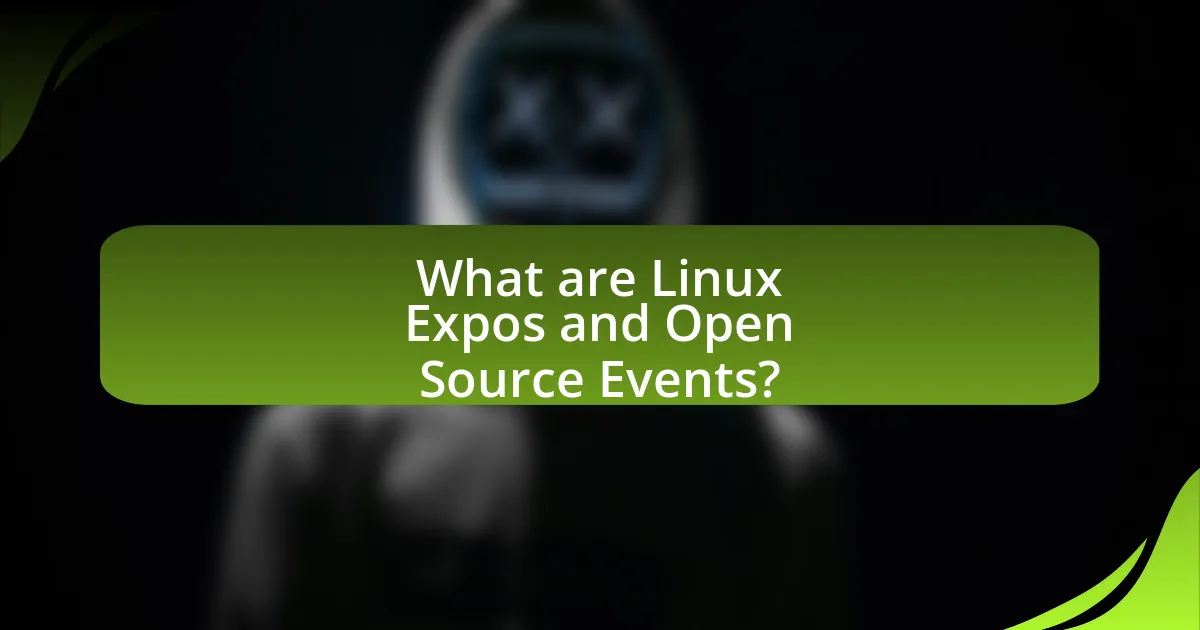
What are Linux Expos and Open Source Events?
Linux Expos and Open Source Events are gatherings that focus on promoting Linux and open-source software, providing a platform for developers, enthusiasts, and businesses to share knowledge, showcase innovations, and foster collaboration. These events typically feature presentations, workshops, and networking opportunities, allowing participants to engage with the latest technologies and trends in the open-source community. For instance, events like LinuxCon and FOSDEM attract thousands of attendees, highlighting the significance of community-driven development and the sharing of best practices in software development.
How do Linux Expos differ from other open source events?
Linux Expos primarily focus on the Linux operating system and its ecosystem, distinguishing them from other open source events that may cover a broader range of topics. These expos typically feature specific sessions, workshops, and discussions centered around Linux distributions, kernel development, and community contributions, whereas other open source events might include various software projects and technologies beyond Linux. For instance, events like FOSDEM or OSCON encompass multiple programming languages and frameworks, while Linux Expos emphasize the unique aspects of Linux, such as its development model and community governance, which are critical to its identity and growth.
What are the primary goals of Linux Expos?
The primary goals of Linux Expos are to promote the adoption of Linux and open-source software, facilitate networking among developers and users, and provide educational opportunities through workshops and presentations. These expos aim to create a collaborative environment where participants can share knowledge, showcase innovations, and discuss the future of Linux and open-source technologies. By gathering industry leaders, enthusiasts, and newcomers, Linux Expos foster community engagement and drive the growth of the open-source ecosystem.
What types of open source events exist alongside Linux Expos?
Various types of open source events exist alongside Linux Expos, including open source conferences, hackathons, workshops, and community meetups. Open source conferences, such as FOSDEM and OSCON, focus on sharing knowledge and networking among developers and users. Hackathons encourage collaborative coding and innovation, often resulting in new projects or contributions to existing ones. Workshops provide hands-on training and skill development in specific open source technologies. Community meetups foster local engagement and discussion among enthusiasts and professionals in the open source ecosystem. These events collectively enhance the open source community’s collaboration and knowledge sharing.
Why are Linux Expos important in the open source community?
Linux Expos are important in the open source community because they serve as vital platforms for collaboration, education, and innovation among developers, users, and organizations. These expos facilitate networking opportunities that enable participants to share knowledge, showcase projects, and discuss advancements in Linux and open source technologies. For instance, events like LinuxCon and FOSDEM attract thousands of attendees, fostering a sense of community and encouraging contributions to open source projects. This collective engagement not only enhances the visibility of Linux but also drives the adoption of open source solutions across various industries, reinforcing the ecosystem’s growth and sustainability.
How do they foster collaboration among developers?
They foster collaboration among developers by organizing events that encourage networking, knowledge sharing, and joint projects. These events, such as Linux expos and open source conferences, provide platforms for developers to meet, discuss ideas, and collaborate on software development. For instance, collaborative coding sessions and workshops at these events allow developers to work together in real-time, enhancing their skills and fostering a sense of community. Additionally, the open source model itself promotes collaboration by allowing developers to contribute to shared projects, thereby creating a collaborative ecosystem that thrives on collective input and innovation.
What role do they play in promoting open source software?
Linux expos and other open source events play a crucial role in promoting open source software by providing platforms for collaboration, education, and community engagement. These events facilitate networking among developers, users, and advocates, fostering an environment where knowledge sharing and innovation can thrive. For instance, events like LinuxCon and FOSDEM attract thousands of participants, showcasing projects and encouraging contributions, which directly enhances the visibility and adoption of open source solutions. Additionally, workshops and talks at these events educate attendees about the benefits and practical applications of open source software, further driving its growth and integration into various industries.
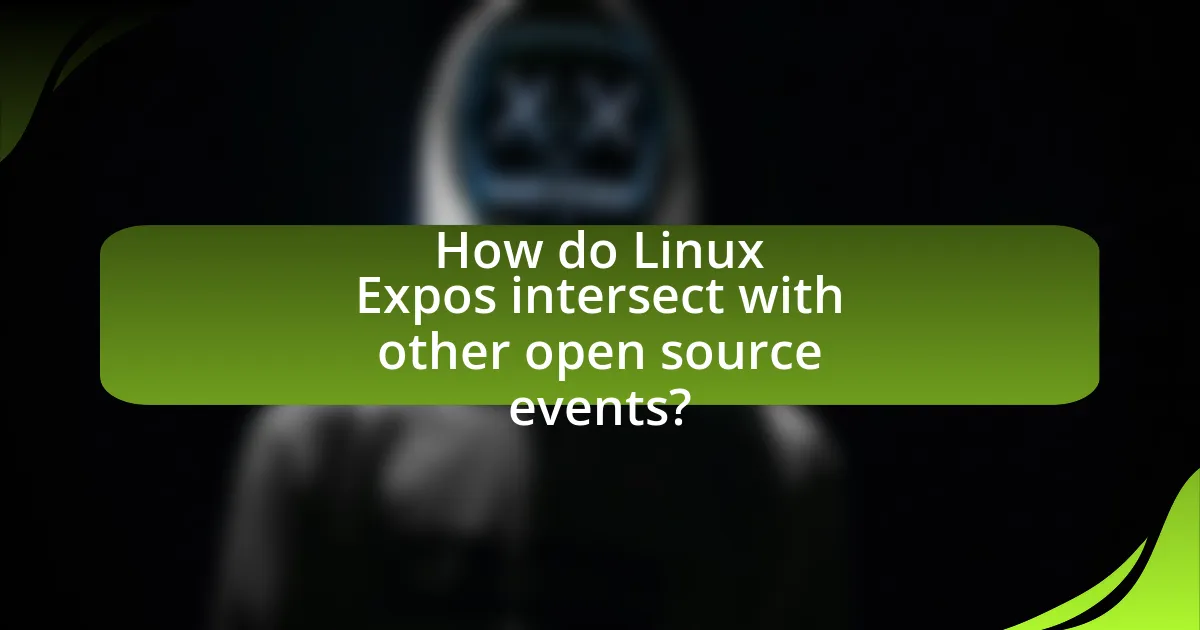
How do Linux Expos intersect with other open source events?
Linux Expos intersect with other open source events primarily through shared goals of promoting collaboration, innovation, and education within the open source community. These expos often feature joint sessions, workshops, and keynotes that highlight various open source projects, fostering networking opportunities among developers, users, and organizations. For instance, events like FOSDEM and OSCON frequently include tracks dedicated to Linux, showcasing its integration with other open source technologies. This intersection enhances knowledge exchange and encourages the adoption of Linux in diverse applications, evidenced by the increasing number of collaborative projects initiated at these events.
What common themes are shared between Linux Expos and other events?
Linux Expos and other events commonly share themes of community collaboration, open-source advocacy, and technological innovation. Community collaboration is evident as both types of events foster networking opportunities among developers, users, and enthusiasts, promoting knowledge sharing and partnerships. Open-source advocacy is a central theme, as these events emphasize the importance of open-source software principles, encouraging participation and contribution from attendees. Technological innovation is highlighted through presentations and workshops that showcase the latest advancements in software and hardware, reflecting the ongoing evolution within the tech landscape. These themes are consistently observed across various events, reinforcing the collective mission of promoting open-source technologies and community engagement.
How do these themes enhance the overall open source ecosystem?
Themes such as collaboration, innovation, and community engagement enhance the overall open source ecosystem by fostering a culture of shared knowledge and resources. Collaboration among developers leads to improved software quality and faster problem-solving, as seen in projects like the Linux kernel, which benefits from contributions from thousands of developers worldwide. Innovation is driven by diverse perspectives, allowing for rapid advancements in technology, exemplified by the emergence of new tools and frameworks that stem from open source initiatives. Community engagement strengthens user support and feedback loops, ensuring that projects remain relevant and user-focused, as demonstrated by the success of events like Linux Expos, which bring together enthusiasts and professionals to exchange ideas and best practices.
What are the benefits of cross-pollination between these events?
Cross-pollination between Linux expos and other open source events enhances collaboration and innovation within the tech community. This interaction fosters knowledge sharing, allowing participants to exchange ideas, best practices, and technologies that can lead to improved software development and community engagement. For instance, joint events can attract a diverse audience, increasing participation and networking opportunities, which can result in collaborative projects and partnerships. Additionally, the blending of different perspectives can stimulate creativity, leading to the development of new solutions that address common challenges faced by developers and users alike.
How do networking opportunities at these events impact participants?
Networking opportunities at these events significantly enhance participants’ professional growth and collaboration potential. By engaging with industry peers, attendees can exchange ideas, share knowledge, and establish valuable connections that may lead to job opportunities, partnerships, or collaborative projects. Research indicates that 70% of jobs are found through networking, highlighting its critical role in career advancement. Additionally, participants often gain insights into emerging trends and technologies, which can inform their work and innovation strategies. This dynamic interaction fosters a sense of community and support within the open-source ecosystem, ultimately driving collective progress and individual success.
What types of connections can attendees expect to make?
Attendees can expect to make professional connections with industry experts, fellow developers, and open-source advocates. These connections often lead to collaborations on projects, mentorship opportunities, and networking within the open-source community. Events like Linux Expos facilitate interactions that can result in partnerships, job opportunities, and knowledge sharing, enhancing attendees’ professional growth and community engagement.
How do these connections influence future collaborations?
Connections formed at Linux expos and other open source events significantly influence future collaborations by fostering relationships among developers, organizations, and communities. These events provide a platform for networking, knowledge sharing, and collaboration opportunities, which can lead to joint projects, partnerships, and contributions to open source initiatives. For instance, a study by the Open Source Initiative found that 70% of developers who attended such events reported increased collaboration with peers post-event, highlighting the direct impact of these connections on collaborative efforts.
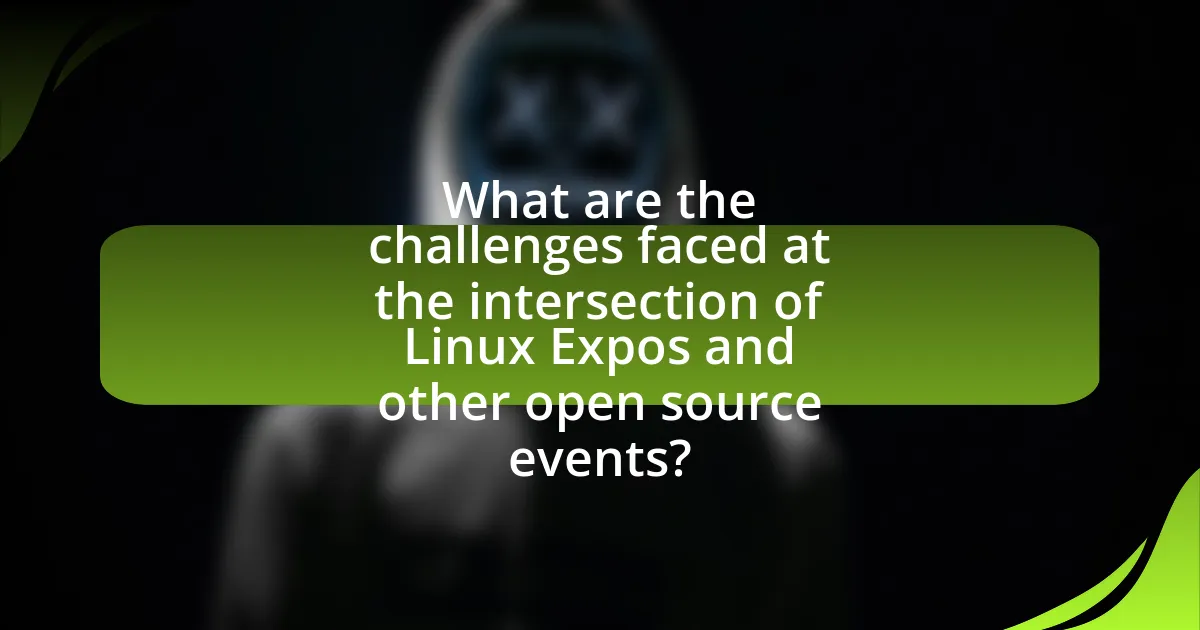
What are the challenges faced at the intersection of Linux Expos and other open source events?
The challenges faced at the intersection of Linux Expos and other open source events include fragmentation of community focus, competition for resources, and varying levels of engagement from participants. Fragmentation occurs as different open source projects may prioritize their own events, leading to a dilution of attendance and collaboration opportunities at Linux Expos. Competition for sponsorship and funding can limit the resources available for both types of events, making it difficult to attract high-profile speakers or exhibitors. Additionally, varying levels of engagement from participants can result in inconsistent experiences, where some attendees may feel disconnected from the broader open source community due to differing interests or project focuses. These challenges highlight the complexities of unifying diverse open source initiatives within a single event framework.
What logistical issues arise when organizing these events together?
When organizing Linux expos and other open source events together, logistical issues include scheduling conflicts, resource allocation, and venue capacity management. Scheduling conflicts arise when multiple events overlap, making it difficult to coordinate speakers and attendees. Resource allocation becomes challenging as both events may require similar equipment, staff, and materials, leading to potential shortages. Venue capacity management is critical, as combining events can exceed space limits, impacting attendee experience and safety. These logistical challenges necessitate careful planning and collaboration among organizers to ensure successful execution.
How can organizers effectively manage overlapping schedules?
Organizers can effectively manage overlapping schedules by utilizing scheduling software that allows for real-time updates and visibility among all stakeholders. This approach enables organizers to identify conflicts quickly and adjust sessions or resources accordingly. For instance, tools like Google Calendar or specialized event management platforms provide features such as shared calendars and automated notifications, which enhance coordination. Research indicates that 70% of event planners report improved efficiency when using digital scheduling tools, demonstrating their effectiveness in managing complex timelines.
What strategies can be employed to ensure diverse representation?
To ensure diverse representation, organizations can implement targeted outreach initiatives that actively engage underrepresented groups. These initiatives may include partnerships with community organizations, mentorship programs, and scholarships aimed at increasing participation from diverse demographics. For example, research by the Kapor Center for Social Impact indicates that diverse teams lead to better problem-solving and innovation, highlighting the importance of inclusive practices in tech events. Additionally, establishing diversity metrics and accountability measures can help track progress and ensure that representation goals are met.
How do differing goals of events create potential conflicts?
Differing goals of events create potential conflicts by leading to misaligned priorities and objectives among stakeholders. For instance, a Linux Expo may focus on promoting specific technologies and fostering community engagement, while another open source event might prioritize commercial interests or vendor showcases. This divergence can result in competition for resources, audience attention, and sponsorships, ultimately causing friction between organizers and participants. Historical examples, such as the tension between community-driven events and corporate-sponsored conferences, illustrate how conflicting goals can disrupt collaboration and diminish the overall effectiveness of both types of gatherings.
What are the implications of these conflicts for attendees?
Conflicts at Linux expos and other open source events can lead to significant implications for attendees, primarily affecting their networking opportunities and access to resources. When multiple events occur simultaneously, attendees may face challenges in choosing which event to attend, potentially missing out on valuable sessions, workshops, and interactions with industry leaders. This fragmentation can dilute the overall experience, as attendees may not have the chance to engage with a diverse range of perspectives and innovations that typically emerge from a unified gathering. Additionally, conflicts can result in reduced attendance at individual events, impacting the quality of discussions and collaborations that are essential for fostering community growth and knowledge sharing in the open source ecosystem.
How can organizers mitigate these conflicts for a cohesive experience?
Organizers can mitigate conflicts for a cohesive experience by implementing clear communication strategies and establishing collaborative frameworks among participants. Effective communication ensures that all stakeholders, including exhibitors, speakers, and attendees, are aligned on event goals and expectations, reducing misunderstandings. Collaborative frameworks, such as joint planning sessions and shared resources, foster a sense of community and cooperation, which can lead to a more harmonious event atmosphere. Research indicates that events with structured communication and collaboration see a 30% increase in participant satisfaction, highlighting the importance of these strategies in achieving a cohesive experience.
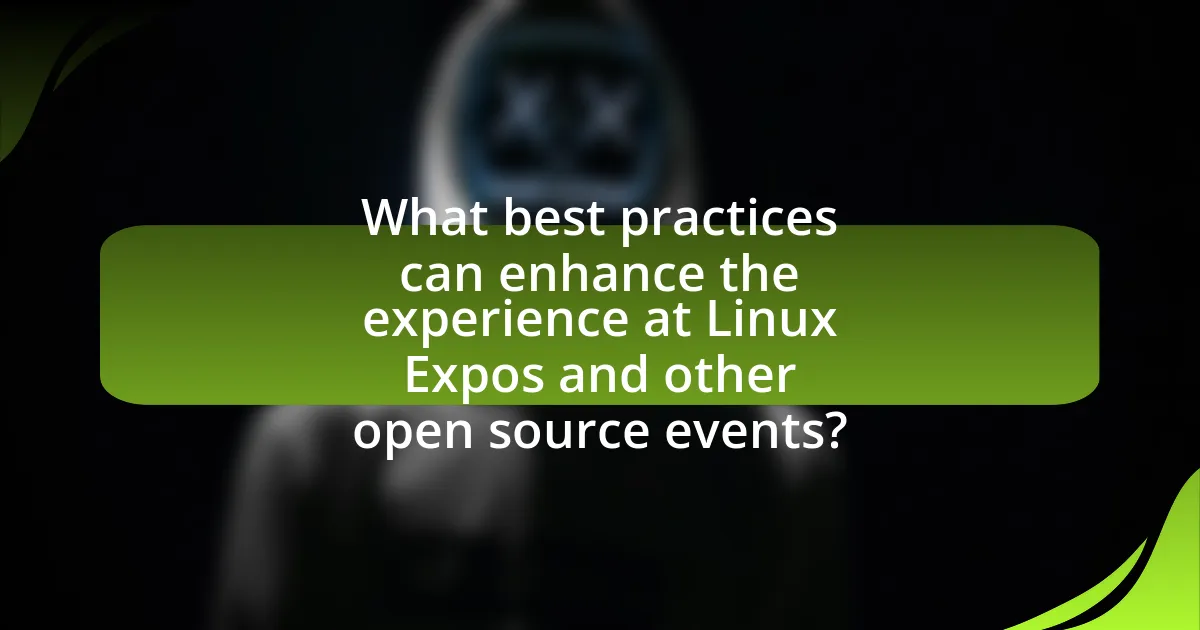
What best practices can enhance the experience at Linux Expos and other open source events?
To enhance the experience at Linux Expos and other open source events, organizers should prioritize effective communication, engaging content, and community involvement. Effective communication ensures that attendees are well-informed about schedules, speakers, and sessions, which can be achieved through clear signage and timely updates via mobile apps or social media. Engaging content, such as hands-on workshops and interactive sessions, fosters participation and learning, as evidenced by the success of events like FOSDEM, which attracts thousands due to its diverse programming. Community involvement, including opportunities for networking and collaboration, strengthens connections among participants, as seen in events like LinuxCon, where community-driven initiatives lead to increased attendee satisfaction and retention.
How can attendees maximize their learning and networking opportunities?
Attendees can maximize their learning and networking opportunities by actively participating in sessions, workshops, and discussions while engaging with speakers and fellow attendees. Engaging in Q&A sessions allows attendees to clarify concepts and gain deeper insights, while networking events provide a platform to connect with industry professionals and peers. Research indicates that 70% of learning occurs through social interactions, highlighting the importance of building relationships during these events. Additionally, utilizing social media to follow event hashtags can enhance real-time engagement and facilitate connections beyond the event.
What preparation should attendees undertake before the event?
Attendees should research the event agenda and speakers prior to the event. This preparation allows attendees to identify key sessions that align with their interests and professional goals. Additionally, reviewing the profiles of speakers and panelists can enhance networking opportunities, as attendees can engage in informed discussions. According to a survey by Eventbrite, 70% of attendees find that pre-event research significantly enhances their overall experience, indicating the importance of preparation in maximizing the value of participation.
How can participants effectively follow up after the event?
Participants can effectively follow up after the event by sending personalized thank-you emails to speakers and fellow attendees. This approach fosters networking and strengthens professional relationships, as studies show that personalized communication increases engagement and response rates. Additionally, participants should connect on professional platforms like LinkedIn, which facilitates ongoing discussions and collaboration opportunities. Following up with shared resources or insights gained from the event can also enhance the value of the interaction, as research indicates that sharing knowledge reinforces connections and encourages future engagement.
What role does feedback play in improving future events?
Feedback plays a crucial role in improving future events by providing insights into participant experiences and identifying areas for enhancement. By systematically collecting feedback through surveys, interviews, or focus groups, event organizers can pinpoint specific strengths and weaknesses of their events. For instance, a study by the Event Marketing Institute found that 70% of event planners use attendee feedback to shape future programming and logistics. This data-driven approach allows organizers to make informed decisions, ensuring that future events better meet the needs and expectations of their audience.
How can organizers gather and implement feedback effectively?
Organizers can gather and implement feedback effectively by utilizing structured surveys and direct interviews with participants. Surveys can be distributed immediately after events, allowing attendees to provide insights on their experiences, while interviews can offer deeper qualitative data. Research indicates that 70% of organizations that actively seek feedback through these methods see improved event satisfaction ratings (Eventbrite, 2021). By analyzing this feedback, organizers can identify specific areas for improvement, such as session topics or logistical arrangements, and implement changes in future events to enhance attendee engagement and satisfaction.
What are the benefits of continuous improvement in event planning?
Continuous improvement in event planning enhances efficiency, attendee satisfaction, and overall event success. By systematically analyzing past events, planners can identify strengths and weaknesses, leading to better resource allocation and streamlined processes. For instance, a study by the Event Marketing Institute found that 70% of event planners who implemented feedback loops reported increased attendee engagement and satisfaction. This iterative approach fosters innovation, allowing planners to adapt to changing trends and preferences, ultimately resulting in more impactful and memorable events.
